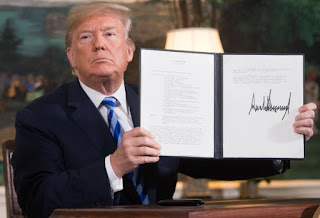President Donald Trump sat down with senior advisers ,discuss how to find an alternative route to attack Iran's main nuclear site.
President Donald Trump sat down with senior advisers last Thursday to discuss how to find an alternative route to attack Iran's main nuclear site. U.S. media reports.
precident-trump-take-advise-senior-advisers-for-an-alternative-to-attack-iran-nuclear-site
Counselors warned him that "military action could lead to widespread conflict," officials were quoted as saying.
According to the Global Nuclear Observatory, Iran's enriched uranium was 12 times the size of the 2015 nuclear deal.
Under the agreement, the United States and five other world powers are exempted from crippling economic sanctions through restrictions on sensitive activities to imply that Iran cannot develop nuclear weapons.
President Trump pulled out of the deal in 2018, saying it was "flawed from its core" and forcibly reinstated U.S. sanctions by negotiating to replace Iran's leaders.
Iran has not agreed to do so, and has taken a number of promises to produce enriched uranium.
Joe Biden, the US president-elect on January 20, said Iran had promised full talks after returning to full compliance. He assured that the issue of rejoining the nuclear deal would be considered later.
The International Atomic Energy Agency (IAEA) said in a report on Wednesday that Iran's stockpile of low-enriched uranium had reached 2,442.9kg (5,385.6lb) - far beyond the 202.8kg limit set under the nuclear deal. And theoretically enough to produce two atoms.
Low-enriched uranium - which usually contains 3-5% concentration of uranium-235. The most suitable isotope for nuclear fission - this uranium is used to produce fuel in power plants. Weapons-grade uranium enriched 90% can get more growth.
 | ||
| FILE PHOTO: Satellite image shows Iran's Natanz Nuclear Facility in Isfahan, Iran, October 21, 2020. Picture taken October 21, 2020 in this image supplied by Maxar Technologies. ©2020 MAXAR TECHNOLOGIES/Handout via-REUTERS/Image Coursty |
The IAEA citation further states that Iran has removed the first cascade of advanced centrifuges used to enrich uranium in an underground plant from a plant at the bottom of its Natanaz enrichment. The underground plant is not usable for advanced centrifuges under the nuclear deal.
Mr. Trump met at the Oval Office with Vice President Mike Pence, Secretary of State Mike Pompeo, Acting Secretary of Defense Christopher, and other top national security advisers to discuss how to respond to the IAEA report. Chairman of the Joint Chiefs of Staff. The New York Times reported the meeting on Monday night.
U.S. officials at the meeting said the president had asked for an alternative to a strike at Iran's main nuclear site - an apparent reference to Natanz.
According to officials, the advisers argued that military action would lead to violent clashes in the region in the last weeks of his presidency.
"He wanted alternatives. They gave him the situation and in the end he decided not to go ahead," the news agency Reuters reported.
"For everyone involved, a conflict with Iran ends badly," he told the Wall Street Journal.
Ali Rabie, a spokesman for the Iranian government, said on Tuesday that "any action against the Iranian nation must face extreme repercussions."
The U.S. and Iran faced war this January, after Mr. Trump ordered a drone strike on Iraq, assassinated top Iranian commander Qasim Solaimani and declared that the Revolutionary Guards General was responsible for the deaths of hundreds of American soldiers.
Iran has responded by firing ballistic missiles at US military bases in Iraq. No Americans died, but traumatic brain injuries affected more than 100 people.

Post a Comment
Don't allow spam link